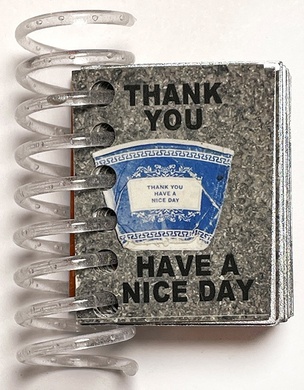STATEMENTS ON APPROPRIATION
Michalis Pichler
if a book paraphrases one explicit historical or contemporary predecessor in title, style and/or content, this technique is what I would call a ‘“greatest hit”.
Maybe the belief that an appropriation is always a conscious strategic decision made by an author is just as naive as believing in an “original” author in the first place.
It appears to me, that the signature of the author, be it an artist, cineaste or poet, seems to be the beginning of the system of lies, that all poets, all artists try to establish, to defend themselves, I do not know exactly against what.
Custom having once given the name of “the ancients” to our pre-Christian ancestors, we will not throw it up against them that, in comparison with us experienced people, they ought properly to be called children, but will rather continue to honor them as our good old fathers.
It is nothing but literature!
there is as much unpredictable originality in quoting, imitating, transposing, and echoing, as there is in inventing.
For the messieurs art-critics I will add, that of course it requires a far bigger mastery to cut out an artwork out of the artistically unshaped nature, than to construct one out of arbitrary material after ones own artistic law.
The authenticity of a thing is the essence of all that is transmissible from its beginning, ranging from its substantive duration to its testimony to the history which it has experienced.
Intellectual Property is the oil of the 21st century.
Certain images, objects, sounds, texts, or thoughts would lie within the area of what is appropriation, if they are somewhat more explicit, sometimes strategic, sometimes indulging in borrowing, stealing, appropriating, inheriting, assimilating … being influenced, inspired, dependent, indebted, haunted, possessed, quoting, rewriting, reworking, refashioning … a revision, re-evaluation, variation, version, interpretation, imitation, proximation, supplement, increment, improvisation, prequel … pastiche, paraphrase, parody, forgery, homage, mimicry, travesty, shan-zhai, echo, allusion, intertextuality and karaoke.
Plagiarism is necessary, progress implies it.
Ultimately, any sign or word is susceptible to being converted into something else, even into its opposite.
Like Bouvard and Pecuchet, those eternal copyists, both sublime and comical and whose profound absurdity precisely designates the truth of writing, the writer can only imitate a gesture forever anterior, never original.
The world is full of texts, more or less interesting; I do not wish to add any more.
The question is: what is seen now, but will never be seen again?
Détournement reradicalizes previous critical conclusions that have been petrified into respectable truths and thus transformed into lies.
No poet, no artist, of any art has his complete meaning alone.










![Protect Me From What I Want Wooden Postcard [Gold Text]](https://d23eqwv5slm408.cloudfront.net/api/file/1rE09CiPQpGMa3jDySHP/convert?fit=max&h=480&w=304&compress=true&fit=max)
![Words Tend To Be Inadequate Wooden Postcard [Gold Text]](https://d23eqwv5slm408.cloudfront.net/api/file/HhtS8vASTpWSUA41En0s/convert?fit=max&h=480&w=304&compress=true&fit=max)

![All Things are Delicately Interconnected Wooden Postcard [Gold Text]](https://d23eqwv5slm408.cloudfront.net/api/file/muHR6MdRL6EgJe6ATC1m/convert?fit=max&h=480&w=304&compress=true&fit=max)

![Protect Me From What I Want Wooden Postcard [Red Text]](https://d23eqwv5slm408.cloudfront.net/api/file/xKZZfpWNQRChHZkrFntw/convert?fit=max&h=480&w=304&compress=true&fit=max)
![All Things Are Delicately Interconnected Wooden Postcard [Red Text]](https://d23eqwv5slm408.cloudfront.net/api/file/C6N6ppL6SnKYeXJuCtbd/convert?fit=max&h=480&w=304&compress=true&fit=max)







![In a Dream You Saw a Way to Survive and You Were Full of Joy Wooden Postcard [Black Text]](https://d23eqwv5slm408.cloudfront.net/api/file/WEd4Y05lROcLsySIoRfJ/convert?fit=max&h=480&w=304&compress=true&fit=max)
![Raise Boys and Girls the Same Way Wooden Postcard [Red Text]](https://d23eqwv5slm408.cloudfront.net/api/file/uV8m1BsaQ6OCflSE578g/convert?fit=max&h=480&w=304&compress=true&fit=max)
![Money Creates Taste Wooden Postcard [Black Text]](https://d23eqwv5slm408.cloudfront.net/api/file/FDyWtNrERsKaawMR4dY8/convert?fit=max&h=480&w=304&compress=true&fit=max)
![The Breakdown Comes When You Stop Controlling Yourself and Want the Release of a Bloodbath Wooden Postcard [Black Text]](https://d23eqwv5slm408.cloudfront.net/api/file/Yq72qCUcTzenjZPmDHHH/convert?fit=max&h=480&w=304&compress=true&fit=max)

![Expiring for Love is Beautiful But Stupid Wooden Postcard [Red Text]](https://d23eqwv5slm408.cloudfront.net/api/file/PT3j9ljKSpS25IO8wycY/convert?fit=max&h=480&w=304&compress=true&fit=max)
![You Are Guileless In Your Dreams Wooden Postcard [Red Text]](https://d23eqwv5slm408.cloudfront.net/api/file/ZK3xDij0TaSAYgCc33sM/convert?fit=max&h=480&w=304&compress=true&fit=max)


![Money Can Buy You Love [Postcard]](https://d23eqwv5slm408.cloudfront.net/api/file/xZZhOmzTJiMu3SC7vLlT/convert?fit=max&h=480&w=304&compress=true&fit=max)


![To Buy Or Not To Buy [Postcard]](https://d23eqwv5slm408.cloudfront.net/api/file/OHBW6G4RGKh49ott8liS/convert?fit=max&h=480&w=304&compress=true&fit=max)

![Private Property Created Crime Wooden Postcard [Black Text]](https://d23eqwv5slm408.cloudfront.net/api/file/KI5UbFcfScGfPtZgAdYY/convert?fit=max&h=480&w=304&compress=true&fit=max)
![Untitled Film Still #21, 1978 [Postcard]](https://d23eqwv5slm408.cloudfront.net/api/file/aPsUudHwRDWz2SwOpwRg/convert?fit=max&h=480&w=304&compress=true&fit=max)
![Untitled [Business as usual] Tote Bag](https://d23eqwv5slm408.cloudfront.net/api/file/5dklHZepSsuX52IdaAV6/convert?fit=max&h=480&w=304&compress=true&fit=max)
















![2025 Slingshot Spiral Desk Organizer [Large]](https://d23eqwv5slm408.cloudfront.net/api/file/ZgnUiIyGQvCJckBO913B/convert?fit=max&h=480&w=304&compress=true&fit=max)
![2025 Slingshot Spiral Organizer [Small]](https://d23eqwv5slm408.cloudfront.net/api/file/KZ7ZLJgxSUOwmKWv37hA/convert?fit=max&h=480&w=304&compress=true&fit=max)







![Blue Moon Ari Marcopoulos T-Shirt [X-LARGE]](https://d23eqwv5slm408.cloudfront.net/api/file/uSvA0LwzRlC8ZekANYmI/convert?fit=max&h=480&w=304&compress=true&fit=max)
![Blue Moon Ari Marcopoulos T-Shirt [LARGE]](https://d23eqwv5slm408.cloudfront.net/api/file/RVRQRVnRQtujs9DmAyCs/convert?fit=max&h=480&w=304&compress=true&fit=max)
![Blue Moon Ari Marcopoulos T-Shirt [MEDIUM]](https://d23eqwv5slm408.cloudfront.net/api/file/v9V1Mlb3RfSvN9glBNMt/convert?fit=max&h=480&w=304&compress=true&fit=max)
![Blue Moon Ari Marcopoulos T-Shirt [SMALL]](https://d23eqwv5slm408.cloudfront.net/api/file/qtNAgHVcRaqHCzkAx5B2/convert?fit=max&h=480&w=304&compress=true&fit=max)
![2025 Slingshot Organizer [Pocket Classic]](https://d23eqwv5slm408.cloudfront.net/api/file/TvyPY1HQySS4aIlgwaK2/convert?fit=max&h=480&w=304&compress=true&fit=max)
